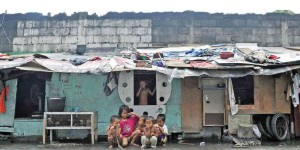Negros Occidental diocese calls for pork abolition

Children in front of their shanty in Manila. Catholic Church officials and priests in the Diocese of San Carlos denounced on Monday those in power who used the pork barrel for their luxurious travels and vacations, and the construction of “state-of-the-art” residences while many suffered in poverty. INQUIRER FILE PHOTO
MANILA, Philippines—The Diocese of San Carlos in Negros Occidental province has joined calls for the abolition of the pork barrel, urging politicians who dipped their hands into the national coffers to travel to remote barangays (villages), check on public schools, interact with “sakadas” (sugar workers) and join poor farmers in the province to witness how they live in “horrible inhuman conditions.”
Fr. Patrick Parcon, administrator of the diocese, also denounced on Monday those in power who used the pork barrel for their luxurious travels and vacations, and the construction of “state-of-the-art” residences while many suffered in poverty.
“Can you allow this to continue? You have the power in your hands to change their lives but what are you doing? You betrayed their trust and confidence. You ignored their abject poverty and used them to perpetuate your selfish ends,” Parcon said in a statement.
Bring guilty to justice
In another statement, Kabankalan Bishop Patricio Buzon said his office was supporting the move to abolish the pork, officially called the Priority Development Assistance Fund (PDAF), and to explore alternative ways of administering government funds in a more transparent, accountable and effective manner.
Article continues after this advertisement“We demand that the government spare no effort in bringing the guilty to justice and just retribution,” Buzon said. “[But] while we denounce the guilty in the scandal, we also strike our breasts and seek atonement and conversion.”
Article continues after this advertisementParcon said the diocese was against the pork barrel system.
“Anything that perpetuates dehumanizing poverty must be abolished. Anything that promotes political manipulation must be eradicated. Anything that encourages graft and corruption must be eliminated [and] anything that deprives the poor of their basic needs must be obliterated,” he said.
Mounting calls
He explained that the diocese was joining mounting calls for the scrapping of the PDAF because it had become a “fertile ground” for corruption, stealing and political manipulation.
“We cannot accept the lies, the blames, the pointing of fingers of those guilty of the misuse of the PDAF for these childish actions are contrary to their being called honorable,” the priest said.
“Those in power whose hands are contaminated by the immoral use of the pork barrel fund must realize the fact that it is their Christian duty and obligation to consider the plight of the underprivileged as their No. 1 priority, not their selfish ends,” he added.
Parcon encouraged these officials to “go to the slums, walk through the streets of big cities, travel to remote barangays, check on the public school classrooms, their libraries and books, their writing desks, immerse yourself in the sakadas of Negros, join the small farmers and land tillers and see for yourself the horrible inhuman conditions they are in.”
He hoped that these lawmakers addressed as “honorable” would eventually choose to become part of the solution instead of the problem to the country’s woes.—Jocelyn R. Uy